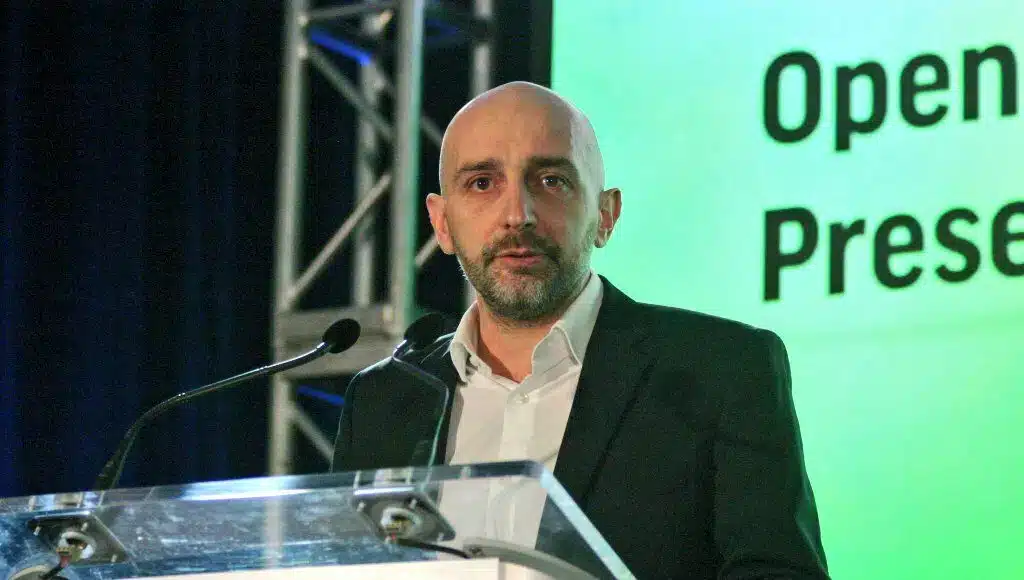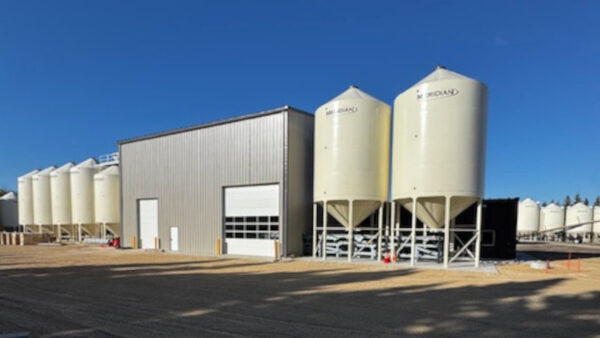Seed World Canada editor Marc Zienkiewicz attended this week’s CrossRoads Crop Conference in Calgary, Alta., and conducted a number of interviews and a panel discussion that will be rolled out on our website and social media channels in the coming days.
How Does Investing in New Genetics Contribute to Sustainability? Stay Tuned for our Panel Discussion
Seed World Canada editor Marc Zienkiewicz moderated a panel discussion on an important topic that’s vital to the future of the seed value chain.
Zienkiewicz was joined by panelists Sheri Strydhorst (Sheri’s Ag Consulting), Jeff Jackson (SeedNet), Greg Stamp (Stamp Seeds), Chelsea Tomlinson (True Seeds) and Morgan Webb (Seed Check) to talk about the seed value chain and how it contributes to sustainability. The discussion will emphasize the importance of investing in new genetics in order to ensure a steady stream of new seed varieties to ensure growers’ success.
“According to the stats available, overall crop yields increased 28% between the 1991-94 period and the 2016-19 period in Canada, due to the influence of new genetics,” Zienkiewicz says, referencing statistics provided by Stuart Smyth, a professor in the Department of Agricultural and Resource Economics at the University of Saskatchewan.
“That speaks to the value of the seed sector in terms of the sustainability of modern farming operations.”
The discussion builds on an Alberta Seed Guide panel held last year at AgSmart, of which several of the panelists were a part.
The AgSmart revolved around the challenges facing the Canadian farming industry, particularly in the realm of seed breeding and adoption of new genetics for crops.

Antoine Bernet: Bridging Borders and Crops for Bayer
Along with event chairperson Todd Hames and Alberta ag minster RJ Sigurdson, Bayer Crop Science Canada’s new country division head Antoine Bernet helped open the 2024 CrossRoads Conference.
Bernet now leads a team of over 550 employees across various offices, research facilities, and production sites nationwide. He also holds a pivotal role as a member of Bayer’s North American Leadership Team for Crop Science.
Expressing his enthusiasm, Bernet acknowledged the stellar reputation of the Canadian crop science business within Bayer and the broader industry. Relocating to Canada to lead the organization represents a significant personal and professional opportunity for him. Bernet is eager to elevate the organization’s sustainable and innovative farming products and practices, leveraging his global experience in tandem with the local team’s deep expertise and commitment to Canadian growers.
With a career spanning over two decades at Bayer, Bernet initially joined the Crop Science division in 2005. His recent role as the Crop Science country division head for Poland, Baltics, Czech Republic, and Slovakia showcased his leadership in driving growth and implementing transformative initiatives. In Canada, he plans to adopt a visionary approach, focusing on both the team and customers to continue the transformative growth initiated by his predecessor.
Bernet’s vision for the upcoming year involves balancing attention to both people and customers. He emphasized the team’s high engagement and commitment to providing optimal solutions for customers to grow more while enhancing their sustainable practices.
“With a range of innovations, including seed and trait technologies, crop protection, and digital farming, we aims to benefit Albertan and Canadian growers within the unique climate and diverse landscape,” he said.
Bernet takes over the reins from Al Driver, who retired from Bayer at the end of 2023. Driver’s longstanding career with Bayer since 1985 saw him in various senior leadership positions, contributing significantly to the growth of the Canadian business and leading the country to be the first globally to complete commercial integration.

Nevin Rosaasen: Offering a Sneak Peek into the Results of a Landmark Watershed Study
A three-year watershed study will help ensure pesticide risk levels are determined using real-world data and not over-conservative models, researchers say.
Nevin Rosaasen is helping spearhead one of the most comprehensive water monitoring studies in Alberta in recent memory.
A lot has gone into it: hundreds of thousands of dollars in funding has allowed researchers to screen a variety of Alberta wetlands adjacent to agricultural land for 127 different pesticides. The data will be stored in an online portal which will be available for consideration in pesticide risk assessments completed by Health Canada’s Pest Management Regulatory Agency (PMRA).
This study will provide useful information that the PMRA can consider in a national water monitoring framework that the PMRA is developing in collaboration with partners across the country.
The watersheds are located in the Three Hills and southern Alberta regions.

Mike Flynn: Settling into a New Role as Alberta Grains’ First Executive Director
Two months ago, Alberta Grains welcomed Michael Flynn as its first executive director. Flynn sat down with Zienkiewicz for an interview on his vision and what’s ahead for the new organization, formed last year from the amalgamation of Alberta Wheat and Alberta Barley.
Flynn brings a wealth of diverse experience in policy development, stakeholder engagement and operations management to the organization and is poised to make the commission a model association in the agricultural sector recognized on a national level.
The new board of directors for Alberta Grains, elected at its annual meeting held yesterday, strongly believes Flynn is the ideal leader to help Alberta farmers navigate ever-changing environmental conditions, government policies, as well as domestic and international market demands farmers are constantly facing, all while aiming to maximize their yields and profit.
“Michael is the perfect person to lead and represent Alberta Grains as the commission’s first executive director,” says Tara Sawyer, the first chair for Alberta Grains. “His track record of leading multiple, diverse organizations that contribute to Albertans in a positive way, along with his experience collaborating with partners and stakeholders of all levels will allow him to seamlessly transition into the role to provide strategic and operational leadership to the organization.”
With over two decades of experience as an executive director with multiple organizations in varied sectors, Flynn’s career has been defined by his commitment to organizations that positively impact Alberta. As the former executive director of the Calgary Police Commission (CPC) and the Urban Development Institute (UDI), he demonstrated his ability to navigate complex policy development, public education, and community stakeholder engagement.













